
Related
Guests
- Tutu Alicanteexecutive director of EG Justice, a U.S.-based organization dedicated to promoting the rule of law, transparency and civil society participation in Equatorial Guinea.
African heads of state are convening today in Equatorial Guinea for a week-long African Union summit. There has been a wave of arrests leading up to the summit, with police detaining an estimated 100 people. Human Rights Watch reports Equatorial Guinea is rife with politically motivated harassment, arbitrary detentions and unlawful killings. The country’s government also faces criticism for spending an estimated $830 million to build a city for the summit, with luxury villas for visiting diplomats, an artificial beach and a golf course. Equatorial Guinea’s dictator, Teodoro Obiang, has led the country since 1979. Despite his human rights record, Obiang has maintained relations with the United States and many U.S. firms, including Exxon Mobil. We speak with Tutu Alicante, executive director of EG Justice, a U.S.-based organization dedicated to promoting the rule of law, transparency and civil society participation in Equatorial Guinea. [includes rush transcript]
Transcript
JUAN GONZALEZ: African heads of state are convening today in Equatorial Guinea for a week-long African Union summit. There’s been a wave of arrests leading up to the summit, with police detaining an estimated 100 people. According to Amnesty International, the police crackdown is intended to prevent pro-democracy protests during the summit. The country banned protests after uprisings against long-term rulers started in the Middle East and North Africa.
Equatorial Guinea is a tiny country located on the west coast of Africa that has grown in importance since its vast oil reserves were discovered in 1995. It currently is chair of the African Union, but many human rights groups are opposed to its involvement in the summit. Human Rights Watch reports that Equatorial Guinea is rife with politically motivated harassment, arbitrary detentions and unlawful killings. This is Arvind Ganesan of Human Rights Watch.
ARVIND GANESAN: Torture has been widespread. Arbitrary detentions have been widespread. And in fact the government even resorted to kidnapping political opposition from abroad at times, or their family members, in order to make sure that there was no real challenge to the government’s power.
JUAN GONZALEZ: Human rights groups have also criticized Equatorial Guinea’s government for spending an estimated $830 million on diplomatic accommodations for the African Union summit, while neglecting the rights of the country’s impoverished majority. The summit is being held in a city built just for the occasion, with luxury villas, an artificial beach and a golf course. Equatorial Guinea’s dictator, Teodoro Obiang, has led the country since 1979. Despite his human rights record, he has maintained relations with the United States and many U.S. firms, including Exxon Mobil and Hess. In September 2009, Obiang posed for a photo with President Obama and First Lady Michelle Obama in New York.
AMY GOODMAN: For more on Equatorial Guinea and the African Union summit, we’re joined by Tutu Alicante in Tampa, Florida. He’s the executive director of EG Justice, a U.S.-based organization dedicated to promoting the rule of law, transparency and civil society participation in Equatorial Guinea.
Welcome to Democracy Now! Can you talk about the situation right now in your country, in Equatorial Guinea?
TUTU ALICANTE: Certainly. First of all, thank you very much, Amy, for this invitation. It is an honor.
What is going on in Equatorial Guinea, as you have expressed during the introduction, is the African Union is holding a summit in Equatorial Guinea, in Malabo, the capital of Equatorial Guinea. Now, back in January 2011, when the African Union announced that it was bestowing on President Obiang the honor of chairing the African Union, our organization, EG Justice, which is an organization run by Equatorial Guineans mostly, called on the African Union and called on the President, at that point, to ensure that some of the key principles, some of the shared values of the African Union, would be implemented in Equatorial Guinea. These are values that are shared universally, you know, values of human rights, respect for human rights, democracy, ending corruption, investing in health and education. And these are things that, up until today, are not taking place in Equatorial Guinea. Despite that, and as you mentioned in the introduction, the government has spent over $830 million in building a city just to host the dignitaries for one week.
JUAN GONZALEZ: And this comes at a time when 75 percent of the people in your country don’t even have running water?
TUTU ALICANTE: Exactly. And I should say, almost jokingly here, that I’ve been concerned recently, right, because when the president of Equatorial Guinea says there are no human rights violations in Equatorial Guinea, and yesterday I was in an interview in which the Equatorial Guinean ambassador in the U.K. said there is no poverty in Equatorial Guinea, right, so I’ve been concerned that I might soon lose my job, you know, if there are no human rights and no poverty in Equatorial Guinea.
Clearly, this is a country that, as you mentioned, you know, according to UNDP statistics, according to World Bank statistics, IMF statistics, etc., over 75 percent of the people in this country are still living on less than a dollar a day, are still living without running water, are still living without sanitation facilities. So, to spend that kind of money to host foreign dignitaries for one week, it seems to me, is preposterous. It’s a waste of resources that should be going to improving life for people in the country.
AMY GOODMAN: As you said, Tutu, government officials in Equatorial Guinea insist the human rights situation in their country is improving. They warn against what they call “foreign meddling.” This is what Carmelo Mekong of the National Commission of Human Rights in Equatorial Guinea told the Christian Science Monitor.
CARMELO MEKONG: [translated] We are obligated to respect these. What we don’t want to accept is a decree from certain countries saying Equatorial Guinea is violating human rights and this and that and so on. There is no unique formula.
AMY GOODMAN: Tutu Alicante, your response?
TUTU ALICANTE: Well, I should tell you that I also was also in an interview—in the interview yesterday with the ambassador, the EG ambassador in the U.K., one of the things that he said is that those of us that criticize Equatorial Guinea are people that have never been to Equatorial Guinea, right? Unfortunately for them, I am from Equatorial Guinea, and I’ve been to Equatorial Guinea, and I was born in Equatorial Guinea.
But what I would say, just last week, on June 11th, there was a German TV crew. This is—I think they’re called the ZDF. They were in Equatorial Guinea filming the women’s soccer team, which should be participating right now in the Berlin competitions for women’s soccer. And this group, after interviewing the team members of the women’s team in Equatorial Guinea, also interviewed kids playing in the slums and interviewed political opposition and interviewed members of civil society. And the government learned of, heard that and confiscated all the footage that they had gotten outside the interviews with the women’s soccer team. Now, if this a government that has nothing to hide, if this is a government that thinks we are meddling, those of us on the outside are meddling, why would they be confiscating footage from a crew that was just recording what they’ve seen in Equatorial Guinea?
JUAN GONZALEZ: Let me—
TUTU ALICANTE: So, clearly, this is not a case of foreigners meddling into what’s happening in EG. This is a case of a government that, rather than investing in its people, is just investing in this big, fancy elephant—you know, big buildings and stadiums and things just to show the international community that they’re building something, when in fact life for the average Equatorial Guinean has not improved since the oil discovery.
JUAN GONZALEZ: Let me ask you about that. How is it that there is such desperate poverty in the country when the country is now rich with oil? And what’s the relationship between Equatorial Guinea and the United States and American oil companies?
TUTU ALICANTE: Well, that discrepancy that you mentioned is exactly what baffles most of us, right? The fact that this is a country that has the highest GDP per capita, income per capita in Africa—I mean, its income per capita is on par with Japan and Germany and the U.K., you know? Yet, most people in EG do not have running water. Where’s all that money going? We know that the government of Equatorial Guinea—well, the President, his family and his son—are all under investigation. They have been under Senate investigation in the U.S. There is an investigation going on by the French judicial authorities right now. There are a couple of investigations going on in Spain, for money laundering, for basically using the monies of the state to buy villas around the world. The son of the President, for instance, owns a $35 million estate in Malibu. We just heard yesterday that the government just purchased another high-end apartment in New York. So, basically, this is a government that, rather than spending money inside the country, government officials, primarily the President and family members, are using all that money to buy properties outside EG.
What’s the relationship between Equatorial Guinea and the United States? Well, oil was discovered in Equatorial Guinea about 15 years ago, mostly by American companies, right? The big American companies. And most of that oil that is produced in Equatorial Guinea is oil that American companies, you know, it bring to the United States and is consumed by United States consumers, right? And at the time that getting oil from Middle East—from the Middle East and other places, war-torn areas, has become a challenge, definitely places like Equatorial Guinea or Nigeria or Angola, where there is no war, have become points of interest for the government of the United States, right?
Now, I should say that today we can say that the United States has improved from the days in which Condoleezza Rice would have said that Equatorial Guinea was “a good friend of the United States,” right? We have improved, and we’re not there anymore. However, the U.S. hasn’t, at least to our liking, hasn’t shown what is the progressive foreign policy that it has towards Equatorial Guinea. At a time where President Obama and Secretary Clinton have made wonderful speeches in Accra and other places in Africa about the importance of promoting democracy, about the importance of promoting transparency, about the importance of using the natural resources of Africa—
AMY GOODMAN: We have five seconds.
TUTU ALICANTE: —to benefit African people, yes, we haven’t seen the U.S. government push President Obiang on those principles.
AMY GOODMAN: And finally, five seconds, the oil companies that are involved? We’re talking Chevron and which others? As well as MPRI, the Military Professional Resources Initiative based in Virginia, getting a $250 million contract last year?
TUTU ALICANTE: Yes. I think Chevron is no longer in Equatorial Guinea. But yes, we are talking about Exxon Mobil and Amerada Hess and Marathon and some smaller companies, as well as MPRI, you know, which are heavily invested in Equatorial Guinea, yes.
AMY GOODMAN: We have to leave it there. Tutu Alicante, thank you so much for being with us. And thank you to WEDU, PBS station in Tampa.

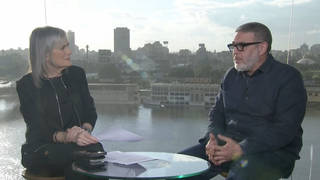
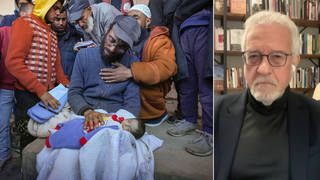
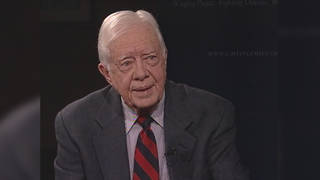
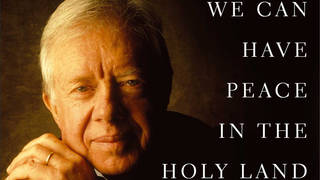





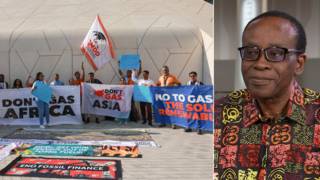
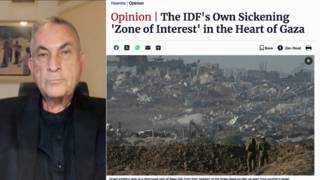
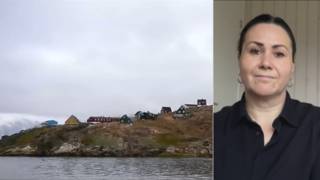
Media Options